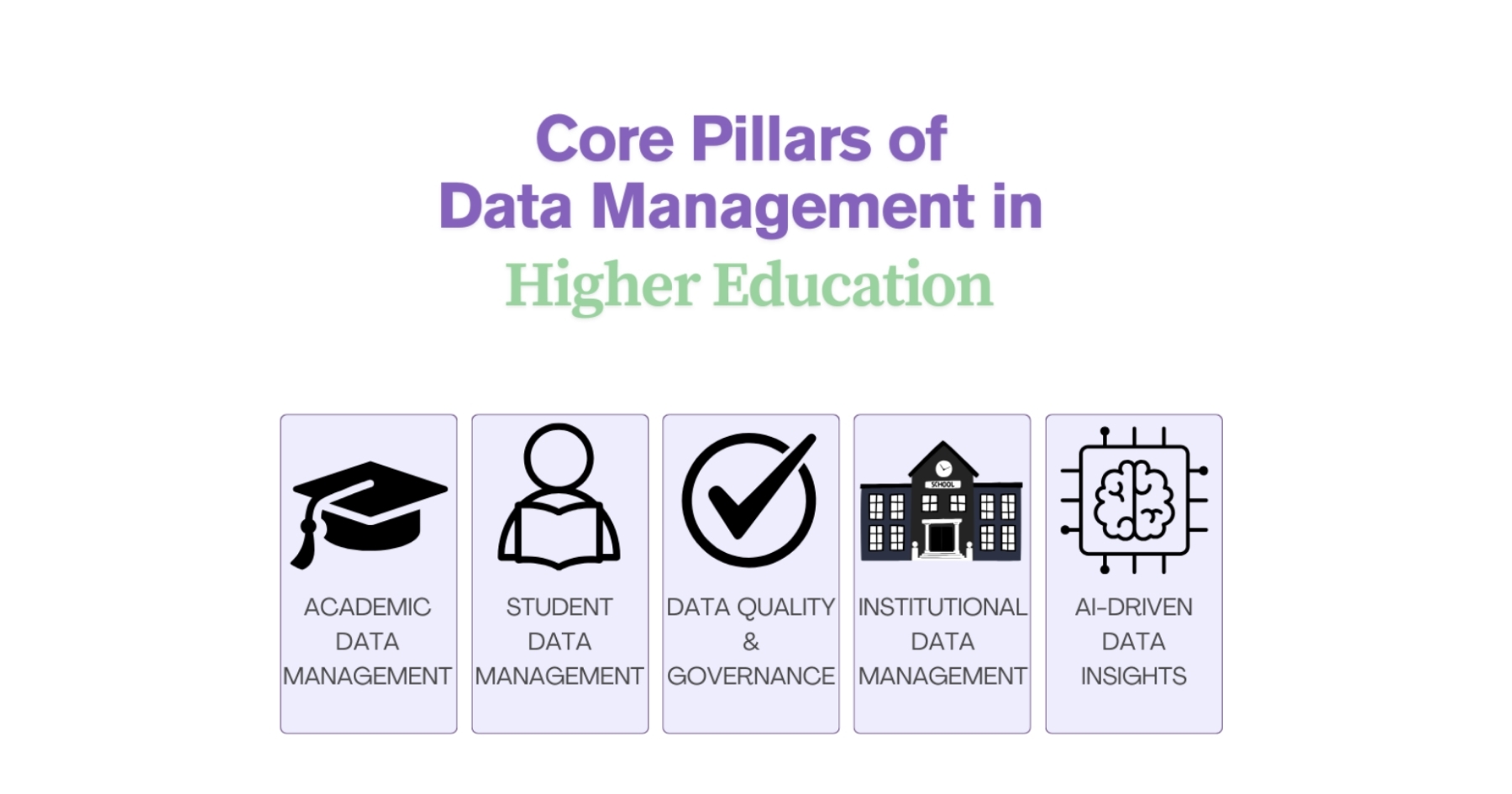
Data Management in Higher Education

Data Management in Higher Education ensures secure, compliant, and efficient handling of academic and student data.
Brief Definition
Data management in higher education refers to the collection, storage, governance, and analysis of academic, student, and institutional data. With increasing regulatory pressure and the rise of data-driven decision-making, educational institutions are leveraging data governance frameworks, data management services, and AI-powered data solutions to manage vast amounts of information efficiently while ensuring privacy and security.
Detailed Definition & Explanation
Data management in higher education encompasses the processes, policies, and technologies used to handle academic and student data. With the rise of digital education platforms and growing regulatory concerns, institutions are adopting comprehensive higher ed data governance practices to safeguard data and ensure compliance with regulations like FERPA (Family Educational Rights and Privacy Act) and GDPR.
Education data management services include data quality assurance, data security protocols, and ensuring proper data lifecycle management. Institutional data management strategies aim to break down silos within universities, integrating data from various departments such as admissions, financial aid, and faculty performance.
AI-powered data management for colleges is transforming how institutions collect, analyze, and use data. By incorporating machine learning algorithms and AI-based tools, universities can automate data-driven insights, improve decision-making, and enhance predictive analytics for student success, enrollment forecasting, and institutional planning.
Types of Data Management in Higher Education:
1) Academic Data Management
Managing grades, transcripts, and course structures to ensure seamless academic operations and compliance with accreditation requirements.
2) Student Data Management
Collecting, storing, and analyzing student demographics, enrollment history, and progress to improve retention and engagement.
3) Data Quality and Governance
Implementing policies and frameworks for data accuracy, security, and compliance with regulations such as FERPA and GDPR.
4) Institutional Data Management
Unifying data from various departments (finance, HR, admissions) to support institutional strategy, resource allocation, and reporting.
5) AI-Driven Data Insights

Why It Matters
-
Supports Regulatory Compliance and Data Security
Effective data governance ensures compliance with regulations such as FERPA, GDPR, and HIPAA, protecting student privacy and securing sensitive institutional data. Universities need robust systems to ensure data quality and accountability while protecting against potential data breaches.
-
Enhances Decision-Making with Data-Driven Insights
With AI-powered data management for colleges, universities can analyze vast amounts of academic, financial, and operational data. This improves decision-making by providing actionable insights on student performance, faculty allocation, and resource optimization, helping leaders plan for long-term success.
-
Improves Student Outcomes and Retention
Student data management allows for real-time tracking of academic progress, identifying at-risk students early. AI-based systems predict student behavior and intervene with personalized support plans, improving retention rates and overall student success.
-
Optimizes Operational Efficiency Across the Institution
Effective institutional data management reduces redundant processes, integrates siloed information, and enables data-driven workflows. This improves operational efficiency, supports better resource allocation, and enhances student services across departments.
Real-World Examples
Educational institutions are increasingly adopting data management services to optimize data collection, improve compliance, and drive institutional success. These examples highlight how data-driven strategies are being applied in the sector:
FD Ryze
FD Ryze enables AI-powered data management for colleges by automating data workflows, enhancing real-time decision-making, and supporting predictive analytics for student retention and institutional planning. Its agentic AI models analyze data from various university systems and provide real-time insights into academic performance and resource allocation.
Ellucian
Ellucian offers comprehensive education data platforms designed for higher education. Their solutions help universities integrate and manage data across campus systems, from admissions and student records to finance and human resources, providing a unified data ecosystem for improved institutional decision-making.
Blackboard
Blackboard provides data analytics services for higher education institutions, supporting data governance, learning management systems, and student engagement. Their AI-powered solutions help universities monitor and analyze student progress and engagement in real time, ensuring timely interventions and improving student retention.
What Lies Ahead
-
AI Will Enhance Predictive Analytics for Student Success
As AI in higher education continues to evolve, universities will leverage AI-driven tools to provide even more precise predictions on student success, enrollment trends, and financial aid needs. Agentic AI will enable real-time adjustments, making interventions quicker and more targeted.
-
Data Integration Across Platforms Will Become Seamless
Institutions will increasingly integrate disparate systems, enabling a more holistic view of institutional data. Data will flow seamlessly across academic, administrative, and student success systems, supporting more comprehensive decision-making. AI-powered systems will be key in automating this data synchronization.
-
Blockchain Will Enhance Data Security and Authentication
Blockchain will be adopted to ensure data integrity, providing an immutable and secure system for storing academic records, financial transactions, and student credentials. Universities will rely on distributed ledger technologies to enhance trust and security in data management.
-
Governance Will Become More Automated and Adaptive
AI-driven governance models will become more adaptive, allowing universities to automatically adjust data policies and security protocols in response to new regulations or emerging threats. Institutions will implement agentic systems to autonomously ensure compliance and optimize data quality across platforms.
See how leading universities are transforming student data management and decision-making. Read the case study.
Related Terms
- Data Governance
- Student Success Platforms
- Academic Data Management
- Predictive Analytics in Education
- Institutional Research
- Blockchain in Higher Education
- AI in Education
- Data Privacy in Education